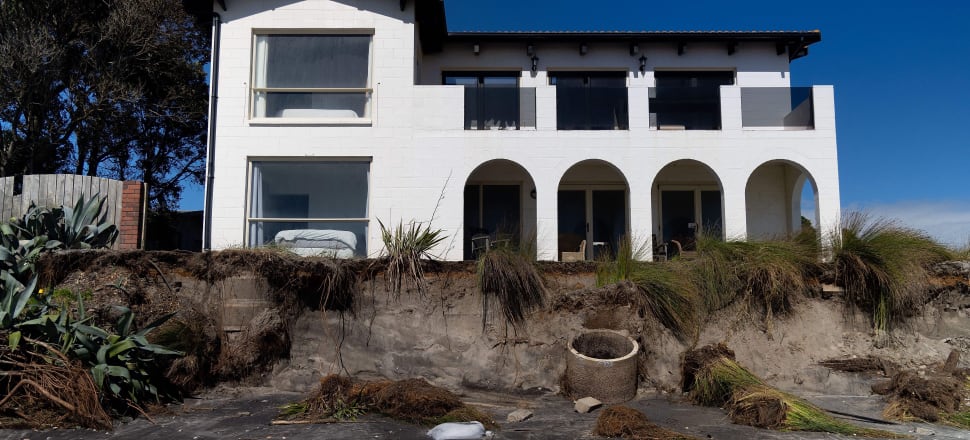
Compensation for private properties and businesses zoned for managed retreat should be capped, writes Prof Jonathan Boston. Taxpayers shouldn't have to fully compensate multi-millionaires for the loss of their coastal mansions.
Opinion: The extreme weather events that have afflicted Aotearoa New Zealand over the past year have highlighted the gravity and urgency of the challenges of adapting to the impacts of climate change.
In particular, the unprecedented Auckland floods in late January and Cyclone Gabrielle in mid-February had a devastating impact on many communities, affecting tens of thousands of households, along with numerous farms and businesses and much public infrastructure.
Unfortunately, worse is to come. This includes more severe storms and related flooding, and the combined impacts of accelerating sea level rise and ongoing land subsidence in many coastal areas.
Inevitably, large numbers of people and physical assets face the prospect of repeated flooding or coastal inundation or both. Exactly how many and when is impossible to calculate with any accuracy. But most coastal communities are likely to be affected to one degree or another. This includes roads, railway lines, airports, and port facilities.
Managed retreat is unavoidable
In some cases, it will be technically feasible and cost-effective to protect at-risk private property and public infrastructure, at least for a while, via better defensive structures. In many other cases, however, the only viable option will be managed retreat – that is, the publicly authorised, purposeful, and coordinated movement of people and physical assets out of harm’s way.
Ideally, such retreat should be precautionary and pre-emptive. This will help reduce the long-term societal costs of climate change.
READ MORE:
* Who moves and who pays? Lessons from past of managed retreat
* Managed retreat from the ‘parasitic’ creep of climate change
* Retreating home and business owners need publicly funded compo
But the question of who should pay looms large. And this issue is now urgent. Because of the recent storms, dozens, if not hundreds, of families face the prospect of their homes being zoned or designated as ‘high-risk’, and thus too risky to inhabit. And many other families would prefer to move elsewhere given the high probability of being flooded again. Yet without public financial assistance to relocate, their choices are often limited.
The funding challenges
The question of how managed retreat should be funded has been exercising the minds of officials in central and local government, and researchers, for several years.
An Expert Working Group on Managed Retreat was established by the Ministry for the Environment in September. The key objective of the group is ‘to assist officials to develop detailed design options for a robust, equitable and enduring managed retreat system’, including its funding and financing.
The group aims to complete a final report by the end of June. Though I am a member of this group, the views expressed here are solely mine and do not purport to represent the group’s forthcoming advice.
“It is important at this time to highlight some issues that can cause confusion or stress. Having a red or yellow sticker on your property does not necessarily mean that a location will be deemed high-risk or that the land can’t be rebuilt upon." – Grant Robertson, Cyclone Recovery Minister
Separately, a project on climate change adaptation was launched by the Environmental Defence Society in mid-2022. The first working paper, which deals with funding issues, was published last month, along with a separate report, which I authored. As it happened, the release of both documents coincided with the full and tragic impact of Cyclone Gabrielle.
Standing back from the particulars, policy makers face several distinct but related challenges. First, they must devise a short-term funding framework to enable post-disaster retreat where the risks are sufficiently great and other adaptation options are not viable. The Minister for Cyclone Recovery, Grant Robertson, outlined the Government’s broad approach to such matters last week; Cabinet is expected to make initial decisions in April.
"It is important at this time to highlight some issues that can cause confusion or stress," Robertson said. "Having a red or yellow sticker on your property does not necessarily mean that a location will be deemed high-risk or that the land can’t be rebuilt upon. These are assessments of immediate safety risk at the location, not future risk of flooding or viability of the land."
Second, policy makers must develop a long-term funding framework that will facilitate pre-event and post-event retreat, and on an ever-increasing scale. And third, they must seek to ensure the urgently needed short-term policy measures do not set undesirable precedents. There is no simple way through these conundrums.
For various reasons, the Government’s immediate policy options are limited. To start with, prompt decisions are essential. Understandably, affected communities and businesses want certainty. And displaced families need to be able to get on with their lives.
Next, in most cases, the funding available for relocation from private insurers and the Earthquake Commission will not cover all the losses experienced by affected property owners. One problem is land: current insurance arrangements only cover the loss of, or damage to, land under certain circumstances. Yet in many cases, the land in question is more valuable than the affected physical structures (or at least this was the situation before the changed risk profile).
Another problem is that not all the properties likely to be designated ‘high-risk’ suffered significant damage. They will not be entitled, therefore, to a full insurance pay-out. Aside from this, there will be many cases of under-insurance, and some damaged properties may be uninsured.
Is it reasonable for multi-millionaires to be fully compensated by taxpayers for the loss of their coastal mansions where pre-emptive retreat is warranted?
In short, without significant public assistance, many property owners confronted with unavoidable relocation will face substantial losses.
Further, most local authorities lack the resources to provide compensation to affected owners. Realistically, therefore, any public compensation for property losses will require central government funding – as it was for red-zoned properties after the Canterbury earthquakes in 2010-11.
Finally, most affected property owners will expect compensation based on pre-event property values, including land. If they are offered significantly less, the Government risks lengthy legal action, not to mention much unfavourable publicity in the run up to the general election.
For all these reasons, it may be difficult for the Government to devise a compensatory framework that is significantly different from that implemented for red-zoned properties after the Canterbury earthquakes.
Developing a longer-term funding framework for managed retreat
Yet whether such a compensatory approach will be publicly acceptable, or indeed desirable, over the longer-term is questionable. Aside from the fiscal implications and risk of moral hazard, fairness issues loom large.
To start with, for pre-emptive retreat (which will often be the most cost-effective adaptation option), insurance will not cover private property losses, residential or otherwise. Hence, unless the affected owners are required to bear some of the losses, the full financial burden will fall on society as a whole (via the state).
Next, many coastal properties at increasing risk of damage from sea level rise or more powerful storms later this century are holiday homes, some of which are inhabited only fleetingly each year. Bear in mind that over a third of families in New Zealand do not own a home, let alone two or three properties. Would it be fair to expect such people to contribute via their taxes to provide full compensation for the losses suffered by the often-wealthy owners of multiple properties where pre-emptive retreat is warranted?
Related to this, some properties that will be at risk in the future are substantial and thus costly to replace. Again, questions of fairness arise. Is it reasonable for multi-millionaires to be fully compensated by taxpayers for the loss of their coastal mansions where pre-emptive retreat is warranted?
To the extent that considerations of fairness point to negative answers to such questions, any long-term compensatory framework for private residential properties zoned for managed retreat is likely to require restrictions on eligibility for public assistance or caps on the total level of compensation or both. The nature of any such restrictions and financial caps will require proper and informed public debate.
Likewise, it will be necessary to consider what kind of public compensation, if any, may be justified for businesses that are required to relocate. Aside from this, the current funding arrangements for public infrastructure will need revision; they are not fit for purpose now, let alone for a world of increasing natural hazards.
It would be highly desirable for such matters to be determined via a multi-party agreement. This will help give any compensation framework greater public legitimacy and longevity. In so doing it will provide more certainty to at-risk communities, enhance the capacity for prudent long-term adaptation planning, including precautionary retreat, and improve overall societal resilience.
Securing a durable agreement will not, of course, be easy. There are many complex policy issues and competing principles. But without such an agreement, the physical impacts and societal costs of climate change will be all the greater.







